Lawyering Peace
Episodes
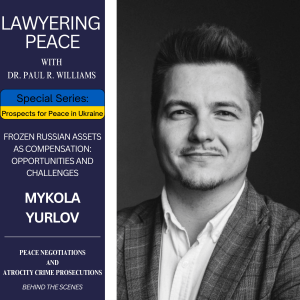
Friday Jun 06, 2025
Friday Jun 06, 2025
What are the legal and political pathways for using frozen Russian assets to compensate Ukraine?
And why has the transfer of these assets become a litmus test for the rules-based international order?
In this episode of Lawyering Peace, Ukrainian diplomat and legal expert Mykola Yurlov joins Dr. Paul R. Williams to discuss how frozen Russian sovereign assets could - and should - be used to support Ukraine’s reconstruction and deliver justice for victims of aggression.
Mykola held the position of Deputy Director of the Department of International Law and Cooperation at the Ministry of Justice, where he led both the International Disputes Unit and the Damage Compensation Unit. In these roles, he contributed to the development of an international compensation mechanism and to Ukraine’s proposal for a special tribunal for the crime of aggression. He also served as Senior Legal Counsel at Truth Hounds, a leading Ukrainian human rights organization documenting war crimes on the ground.
Mykola breaks down the legal foundation for asset transfers under international law, including the use of countermeasures and the principle of state responsibility. He outlines how these transfers would support the three-part international compensation mechanism: the Register of Damage, a future Claims Commission, and a Compensation Fund.
The conversation explores both the legal feasibility and the political resistance surrounding asset transfers, especially debates over sovereign immunity, reversibility, and potential financial precedent. Mykola explains why delay harms not only Ukraine, but the broader credibility of international law.
🎧 Tune in for a timely discussion on law, reparations, political will, and the global implications of frozen asset policy.
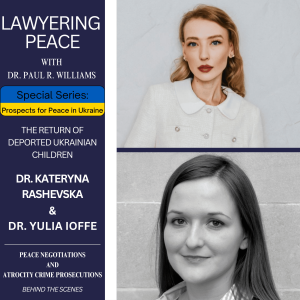
Friday May 30, 2025
Friday May 30, 2025
What does international law owe to Ukraine´s deported children?Why is Russia’s forced transfer of Ukrainian children a defining issue for global justice?
In this episode of Lawyering Peace, Ukrainian international legal experts Dr. Yulia Ioffe and Dr. Kateryna Rashevska join Dr. Paul R. Williams to discuss the illegal deportation of Ukrainian children to Russia and Russian-occupied territories—a policy many argue constitutes genocide.
They examine the strategic, ideologically motivated nature of the deportations: re-education, forced adoptions, name changes, and the erasure of Ukrainian identity. The conversation highlights how this tactic not only breaks international law but also threatens the integrity of the rules-based international order.
Drawing on their legal and advocacy experience, Ioffe and Rashevska reflect on the limits of current enforcement tools, the urgent need for repatriation and reintegration, and how the international community must close accountability gaps. They also explain how the legal response to these crimes could shape the future of child protection in armed conflict more broadly.
🎧 Tune in for a timely discussion on genocide, international law, and the moral and legal imperative to return Ukraine’s children.
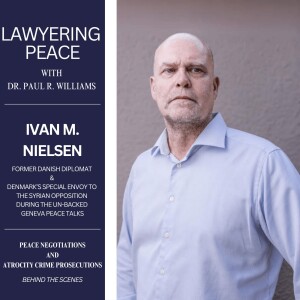
Thursday May 15, 2025
Behind the Geneva Talks: Ivan M. Nielsen Diplomacy and Peace in Syria
Thursday May 15, 2025
Thursday May 15, 2025
What do negotiations look like when one party to peace talks never intended to negotiate in good faith?What can we learn from peace talks that didn’t lead to peace?
In this episode of Lawyering Peace, former Danish diplomat Ivan M. Nielsen joins Dr. Paul R. Williams to reflect on his role as Denmark’s Special Envoy to the Syrian Opposition during the UN-backed Geneva peace talks.
Nielsen offers an insider's view of the Geneva process, describing how the Assad regime went through the motions of negotiation while continuing attacks on civilians—with Russia’s backing. He discusses the complex dynamics of engaging with a fragmented opposition, the structural challenges posed by the UN framework, and the difficulty of maintaining a meaningful diplomatic process under asymmetrical conditions.
Drawing on his experience in Syria, Iraq, Afghanistan, and South Africa, Nielsen shares core lessons that are important for both Syria and other post-conflict states. Nielson offers us a cautious but enduring message of optimism about Syria’s long road ahead.
🎧 Tune in for an insightful and thoughtful discussion on diplomacy, accountability, and the struggle for peace in Syria.
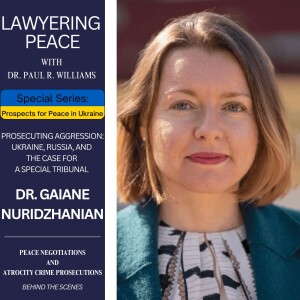
Thursday May 08, 2025
Thursday May 08, 2025
Why does the crime of aggression matter for Ukraine and international peace?
How can a Special Tribunal hold Russian leaders accountable?In this episode of Lawyering Peace, Ukrainian international lawyer Dr. Gaiane Nuridzhanian joins the conversation to explain the case for a Special Tribunal for the Crime of Aggression against Ukraine.
Dr. Nuridzhanian walks us through the evolution of the debate surrounding the crime of aggression, and presents a treaty-based tribunal—supported by Ukraine and the Council of Europe—as a legally sound, politically feasible alternative.
The conversation explores legal and strategic questions around the establishment of such a tribunal, from head-of-state immunity and trials in absentia to the inclusion of victims and its implications for future peace negotiations.
In a moment when the rules-based international legal order is under threat, our conversation with Dr. Nuridzhanian reminds us why prosecuting Russia’s war of aggression is critical not just for Ukraine, but for global accountability and future conflict prevention. Tune in for a timely discussion on justice, accountability, and international legal innovation.
-----------------------Ukraine and its allies stand at a critical juncture as they pursue a just and lasting peace and an end to Russia’s war of aggression. The road ahead is fraught with difficult issues that will arise during a future peace process, from territorial integrity and post-war security frameworks to EU accession and justice and accountability.
In this special mini-series, Prospects for Peace In Ukraine, we sit down with Ukrainian and international experts in law, diplomacy, and peace negotiations to explore some of these key issues. Together, we examine the strategies, options, and opportunities ahead as Ukraine and its allies navigate the peace process against a shifting international landscape.
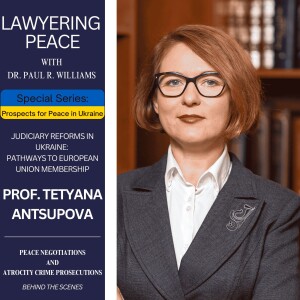
Tuesday Apr 15, 2025
Tuesday Apr 15, 2025
How is Ukraine reforming its judiciary while defending itself from Russian aggression?
What role does judicial reform play in Ukraine’s pursuit of EU membership and democratic transformation?In this episode, Prof. Tetyana Antsupova joins Dr. Paul R. Williams on the Lawyering Peace podcast.
Prof. Antsupova—former Supreme Court judge of Ukraine and British Academy Research Fellow—shares personal and professional reflections on the sweeping judicial reforms unfolding in Ukraine since 2014.
This episode examines how Ukraine is rebuilding judicial institutions in line with EU standards, balancing wartime pressures with long-term goals. Prof. Antsupova highlights the role of international experts, civil society, and European partners in building trust, advancing independence, and fostering resilience within the judiciary.
She also reflects on lessons from other EU states, the unique challenges of judicial reform during active conflict, and the urgent need for long-term strategic planning and public confidence in the rule of law.
This conversation demonstrates how Ukraine’s judiciary stands as a testament to resilience and reform in the face of aggression.
-----------------------Ukraine and its allies stand at a critical juncture as they pursue a just and lasting peace and an end to Russia’s war of aggression. The road ahead is fraught with difficult issues that will arise during a future peace process, from territorial integrity and post-war security frameworks to EU accession and justice and accountability.
In this special mini-series, Prospects for Peace In Ukraine, we sit down with Ukrainian and international experts in law, diplomacy, and peace negotiations to explore some of these key issues. Together, we examine the strategies, options, and opportunities ahead as Ukraine and its allies navigate the peace process against a shifting international landscape.
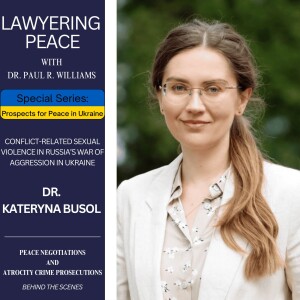
Thursday Apr 10, 2025
Conflict-Related Sexual Violence in Russia’s War in Ukraine with Dr. Kateryna Busol
Thursday Apr 10, 2025
Thursday Apr 10, 2025
How has Russia used conflict-related sexual violence as a tool in its war of aggression?
What does meaningful justice for survivors of Russia’s conflict-related sexual violence look like? In this episode, Dr. Kateryna Busol joins Dr. Paul R. Williams on the Lawyering Peace podcast.
Dr. Busol explores the widespread and systematic use of conflict-related sexual violence (CRSV) by Russian forces in Ukraine. Dr. Busol explores how societal norms and toxic gender hierarchies in Russia fuel the use of CRSV as a weapon of Russian aggression, and the impact on both survivors and Ukrainian society at large.
She thoughtfully explains the challenges that survivors face in seeking justice, and the ways in which female victims have spearheaded the effort to advocate for male survivors of CRSV.
Dr. Busol stresses the need for survivor-centered, gender-sensitive approaches to accountability, emphasizing that reparations should include not just financial compensation but also rehabilitation, symbolic recognition, and guarantees of non-repetition.
This discussion underscores the intersection of CRSV with broader peace and justice issues, highlighting the importance of a meaningful and holistic justice process. Dr. Busol reminds us that addressing such violence is key to achieving a sustainable, survivor-centered peace.
The conversation demonstrates the need to pursue a meaningful and holistic justice process for survivors of CRSV. Dr. Busol underscores the ways in which conflict-related sexual violence intersects with broader issues of peace and justice, demonstrating that addressing such violence is essential for a sustainable and survivor-centered peace.
-----------------------Ukraine and its allies stand at a critical juncture as they pursue a just and lasting peace and an end to Russia’s war of aggression. The road ahead is fraught with difficult issues that will arise during a future peace process, from territorial integrity and post-war security frameworks to EU accession and justice and accountability.
In this special mini-series, Prospects for Peace In Ukraine, we sit down with Ukrainian and international experts in law, diplomacy, and peace negotiations to explore some of these key issues. Together, we examine the strategies, options, and opportunities ahead as Ukraine and its allies navigate the peace process against a shifting international landscape.
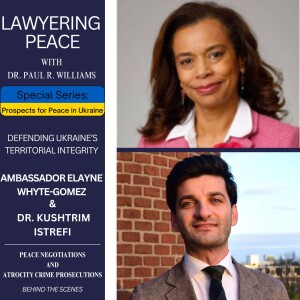
Thursday Apr 03, 2025
Thursday Apr 03, 2025
How can Ukraine protect its territorial integrity in peace negotiations?
What role does the international community play in ensuring that no territory is lost? In this episode, Ambassador Elayne Whyte Gómez of Costa Rica and member of PILPG’s Circle of Former Ambassadors, and Professor Kushtrim Istrefi of Utrecht University and PILPG Senior Peace Fellow, join the conversation.
Ambassador Gómez and Professor Istrefi explore questions relating to Ukraine’s territorial integrity and the central importance of maintaining its rightful territorial claims during peace negotiations.
Negotiations to end Russia’s war have gained momentum in recent weeks. However, the question of Ukraine’s occupied territories and their future status remains a key concern for Ukraine and its allies as they consider what a future peace agreement may look like.
Russia continues to deny the validity of Ukraine’s rightful claim to its internationally recognized borders as of 1991, and seeks to portray its war of aggression as . However, as our guests demonstrate, Ukraine’s claim is firmly rooted in international law. Our experts discuss the risks of unresolved territorial disputes, the role of international law, and outline practical tools at Ukraine and its allies’ disposal to maintain Ukraine’s territorial claim during peace negotiations, including international administration and non-recognition strategies.
In a war which Russia consistently claims is based on self-defense and self-determination, our guests remind us that it is crucial to keep focus on the reality of Russia’s invasion as a war of aggression against the territorial sovereignty of Ukraine. Tune in for a compelling discussion on how Ukraine can push back against historical distortions, build alliances, and secure its future.
-----------------------Ukraine and its allies stand at a critical juncture as they pursue a just and lasting peace and an end to Russia’s war of aggression. The road ahead is fraught with difficult issues that will arise during a future peace process, from territorial integrity and post-war security frameworks to EU accession and justice and accountability.
In this special mini-series, Prospects for Peace In Ukraine, we sit down with Ukrainian and international experts in law, diplomacy, and peace negotiations to explore some of these key issues. Together, we examine the strategies, options, and opportunities ahead as Ukraine and its allies navigate the peace process against a shifting international landscape.
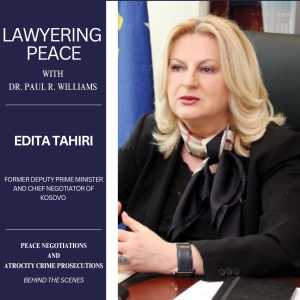
Tuesday Jan 07, 2025
Edita Tahiri: Trailblazer for Kosovo's Independence and Gender Equality
Tuesday Jan 07, 2025
Tuesday Jan 07, 2025
Meet Edita Tahiri, Kosovo's former Deputy Prime Minister and chief negotiator. From leading peace talks during the Rambouillet negotiations to championing gender equality in the Balkans, Edita shares her inspiring story of resilience, diplomacy, and the pursuit of peace. Discover her insights into unifying delegations, advocating for independence, and addressing the ongoing challenges of unfinished peace with Serbia.
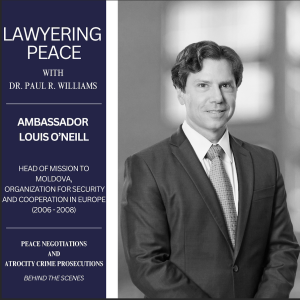
Monday Dec 16, 2024
Monday Dec 16, 2024
In this episode, Ambassador Lou O’Neill unpacks Moldova’s ongoing struggles with frozen conflicts in Transnistria and Gagauzia, the far-reaching ramifications of Russian influence, and how the war in Ukraine has reshaped the region’s dynamics.
Drawing from his tenure as OSCE Ambassador to Moldova (2006–2008), Lou provides critical insights into Moldova’s October 2024 EU accession and presidential election votes—controversial and closely contested, with EU accession winning by a narrow margin.
Lou reflects on cultural dynamics, offering insights into how Moldova can leverage its EU aspirations to foster unity and progress.
Discover how geopolitical strategies, diplomatic creativity, and evolving contexts could shape Moldova’s future in this pivotal episode.
-----------------
Host & Executive Producer: Dr. Paul R. Williams
Co-Producer & Content Manager: Katie Hetherington
Co-Producer & Creative Manager: Ryan Westlake
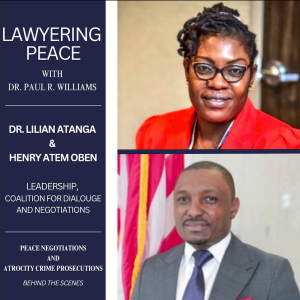
Monday Dec 09, 2024
Monday Dec 09, 2024
In Part 2 of the conversation with Dr. Lilian Atanga and Henry Atem on the Southern Cameroon conflict, we dive into the 2022 Canada Peace Talks, where the Ambazonia delegation—comprising leaders from various separatist groups—worked to build internal cohesion and present a united front. Their efforts, along with those of the Canadian facilitators, were met with an abrupt withdrawal by the Cameroonian government after three meetings, followed by its denial of ever participating in the talks.
Dr. Lilian Atanga and Henry Atem break down how the Canada process was structured and highlight the critical role of inclusivity in peace negotiations. They also reflect on how the pattern of the government’s actions in peace processes over the years underscore its reluctance to engage in genuine negotiations to settle the conflict.
Tune in for a powerful conversation on this pivotal moment in the Southern Cameroon conflict, the lessons learned, and what lies ahead for the path to peace.
---------------
Host & Executive Producer: Dr. Paul R. Williams
Co-Producer & Content Manager: Katie Hetherington
Co-Producer & Creative Manager: Ryan Westlake
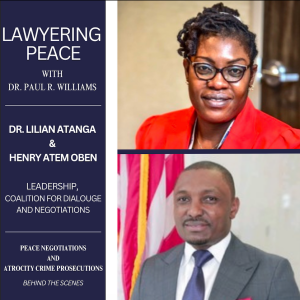
Monday Dec 09, 2024
Monday Dec 09, 2024
In this episode of the Lawyering Peace podcast, we delve into the complex and ongoing conflict between Anglophone Southern Cameroon (Ambazonia) and the Francophone central government of Cameroon. Rooted in a history of colonization by different powers, the two regions developed distinct cultures. Over decades, this divide has been exacerbated by persistent systemic marginalization and discrimination against Southern Cameroonians. In 2016, these divisions escalated into an armed conflict involving numerous separatist groups and leaving civilians caught in the crossfire.
Joining the discussion are two expert voices from the Board of Directors of the Coalition for Dialogue and Negotiation, a U.S.-based nonprofit dedicated to fostering dialogue and peacebuilding in Cameroon. Dr. Lilian Atanga and Henry Atem Oben provide critical insights into the series of failed peace processes leading up to the 2022 Canada Talks. These include the 2016 teachers' and lawyers' strike, the government’s reneged offer of federalism, the 2019 National Dialogue, and the 2020–2022 Geneva Initiative. Together, they highlight how these efforts reveal the Cameroonian government’s repeated missed opportunities to negotiate a peaceful resolution with Ambazonia.
The episode delves into how the Ambazonia delegation, supported by the Coalition for Dialogue and Negotiation, prepared for the 2022 Canada Talks, and explores the delegation’s positions on key issues such as self-determination, disarmament, and accountability for atrocity crimes.
Tune in for a deep dive into the history, challenges, and opportunities of this conflict. Stay tuned for Part 2, where we analyze the 2022 Canada Peace Talks and discuss what’s next for Ambazonia.
--------------
Host & Executive Producer: Dr. Paul R. Williams
Co-Producer & Content Manager: Katie Hetherington
Co-Producer & Creative Manager: Ryan Westlake
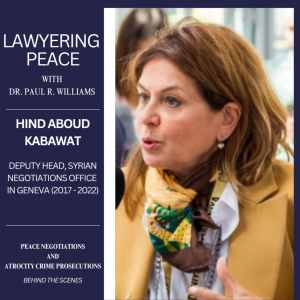
Wednesday Oct 09, 2024
Hind Kabawat: The Role of Women in the Syrian Peace Process
Wednesday Oct 09, 2024
Wednesday Oct 09, 2024
In this powerful episode, we sit down with Hind Kabawat, Deputy Head of the Syrian Negotiation Commission Office in Geneva. Hind shares her insights from growing up in Damascus to becoming a key figure in the Geneva peace talks.
Hind delves into the profound challenges faced during the Syrian conflict, from the brutal dictatorship to the devastating chemical attacks in Ghouta. She recounts the harrowing experiences of Syrian activists and civilians who have endured unimaginable suffering, and how the Arab Spring ignited a flame of hope among Syrians longing for change.
As a lawyer and peacebuilder, Hind emphasizes the importance of women's involvement in peace negotiations. She discusses her pioneering efforts to create a women's consultation, overcoming opposition from male colleagues, and ultimately securing a 30% quota for women’s representation in the opposition delegation during the Syrian peace negotiations. Hind illustrates how these efforts brought together women from diverse backgrounds to push for justice, human rights, and the inclusion of their voices in shaping Syria’s future.
Listeners will gain insight into some of the challenges faced by the Syrian opposition delegation, including the difficulty of negotiating with actors actively killing their families and friends. Hind also provides insights into the delegation’s strategic use of media, and the critical roles played by women as well as grassroots movements in sustaining dialogue and preparing for a future peace. Hind candidly shares her views on the international community’s role, the failures of the Geneva talks, and the persistent need for transitional justice in Syria.
Hind’s story is a testament to the resilience and determination required to pursue peace in the face of adversity. Her message is clear: peace is not just about negotiations at the table; it’s about fostering a culture of dialogue, inclusion, and justice that transcends political will. This episode is a must-listen for anyone interested in the dynamics of peacebuilding, the power of women in conflict resolution, and the ongoing struggle for a peaceful future in Syria.
--------------
Host & Executive Producer: Dr. Paul R. Williams
Co-Producer & Content Manager: Katie Hetherington
Co-Producer & Creative Manager: Ryan Westlake